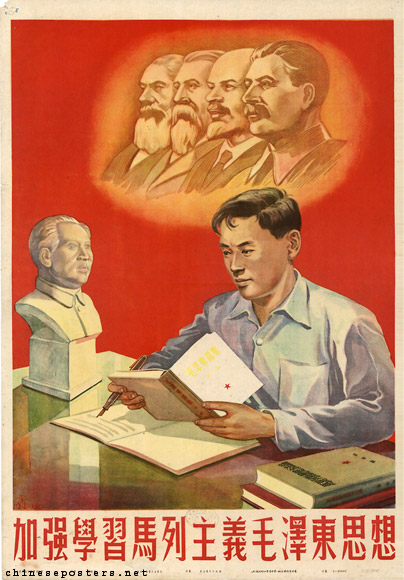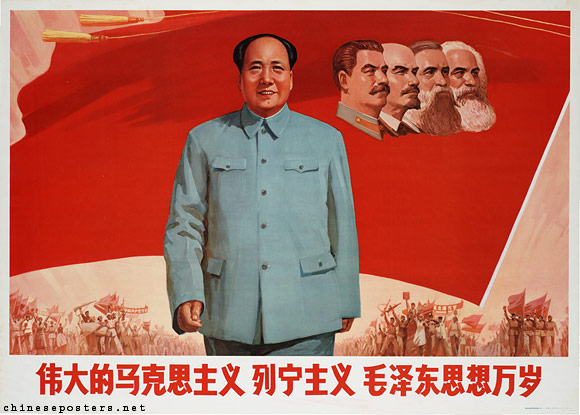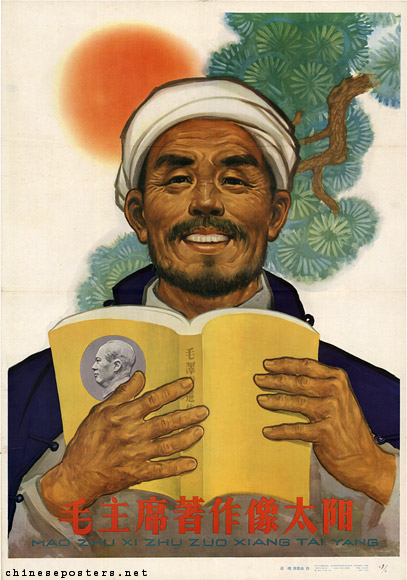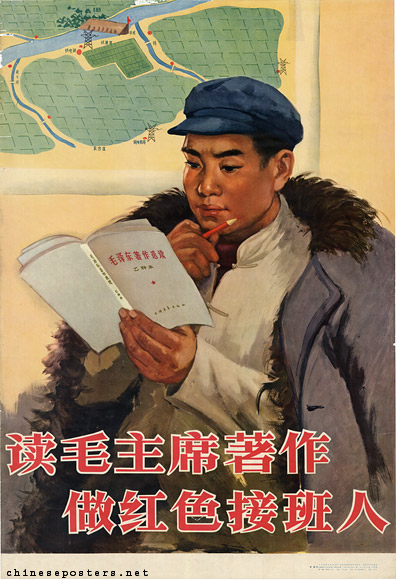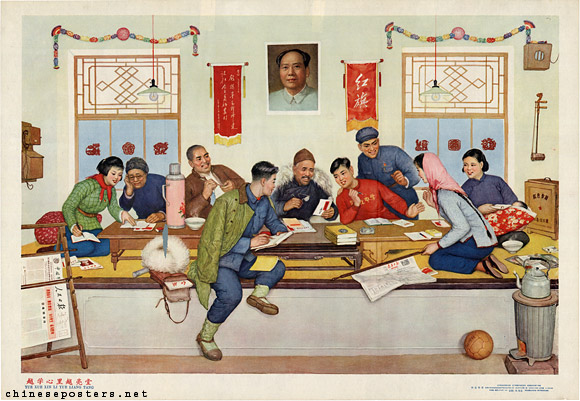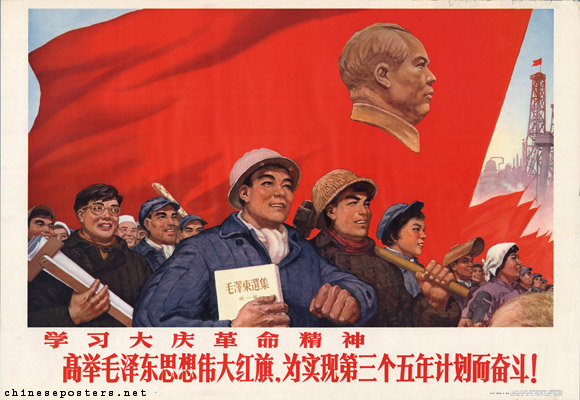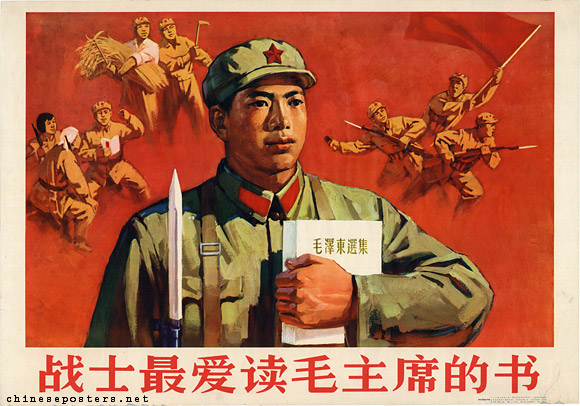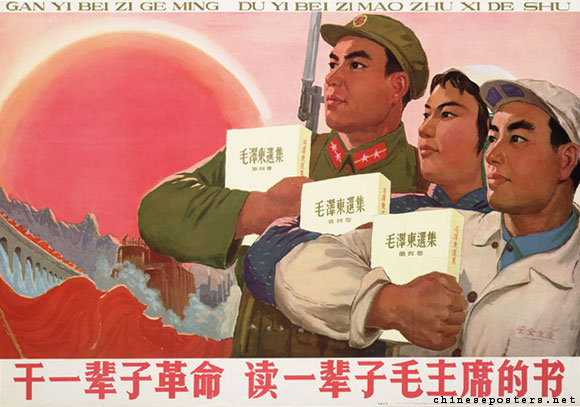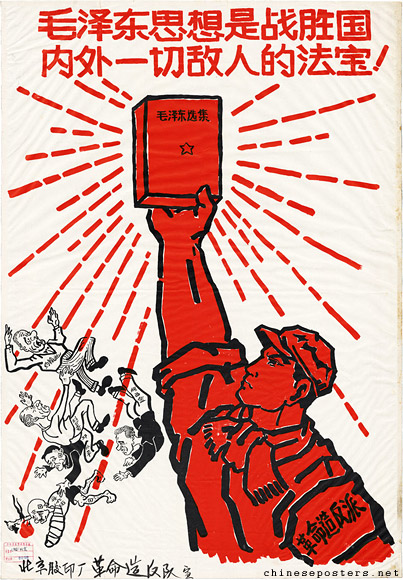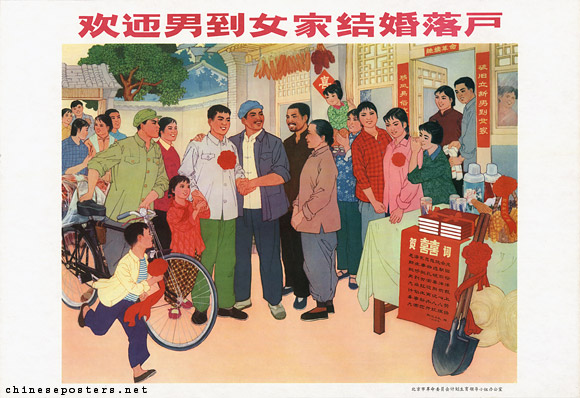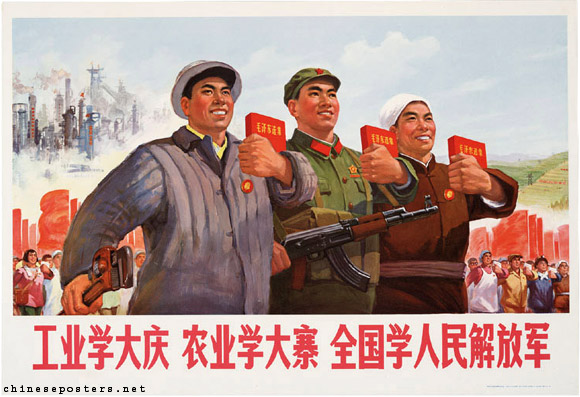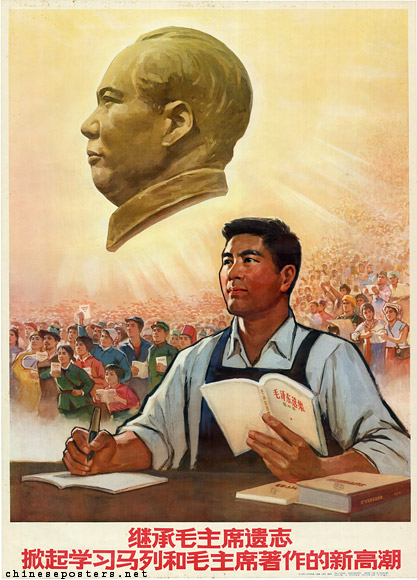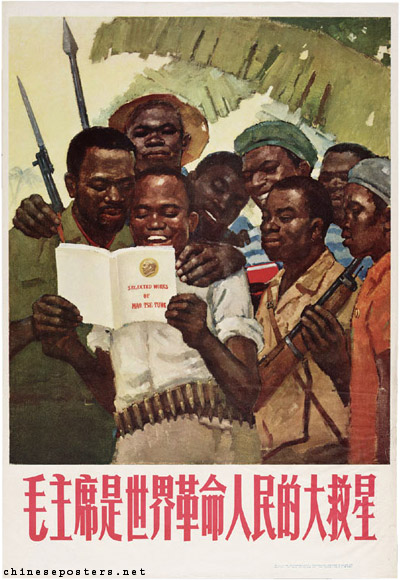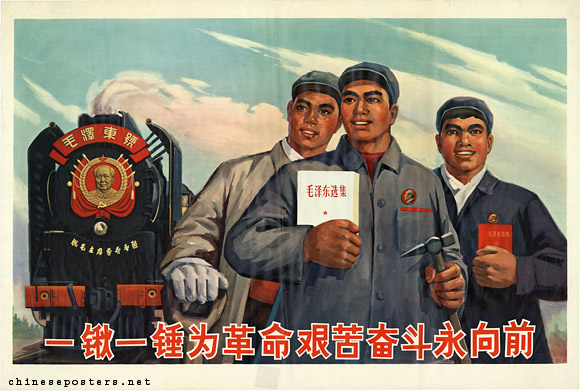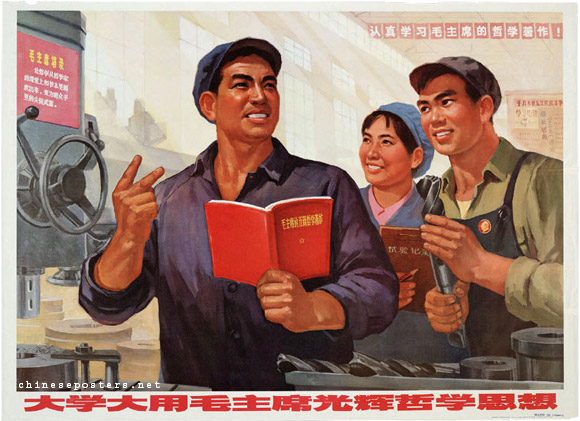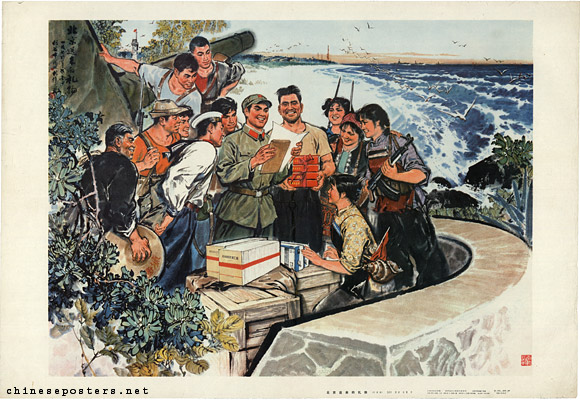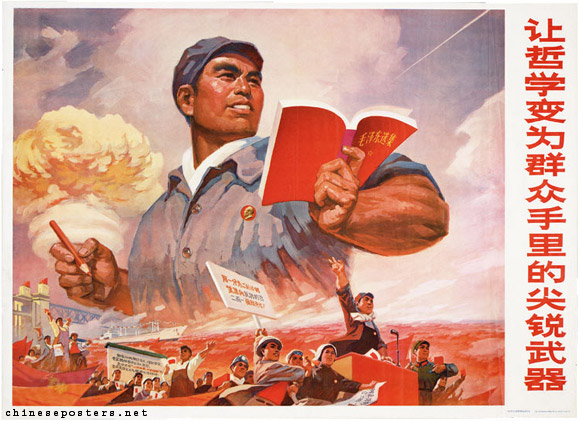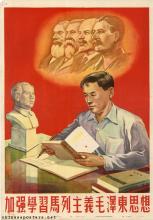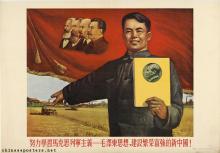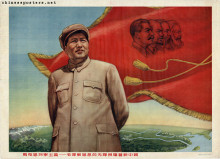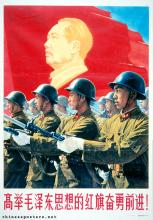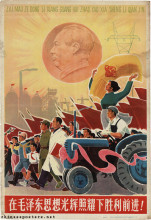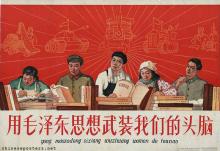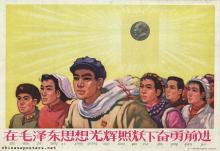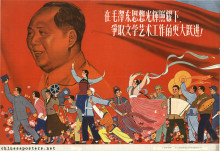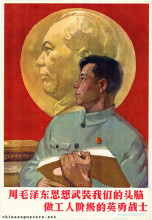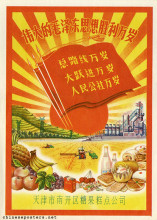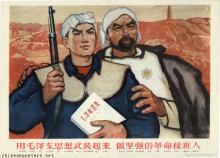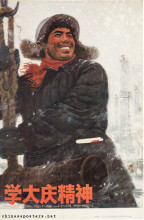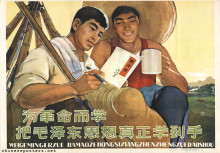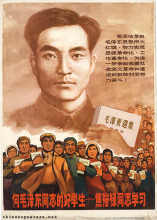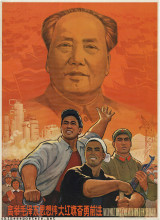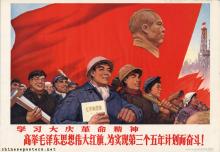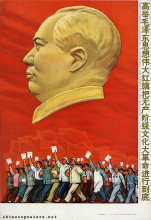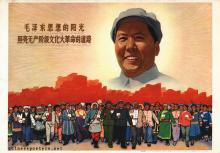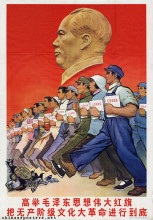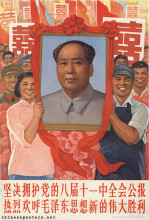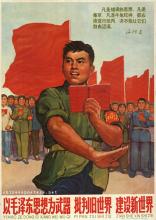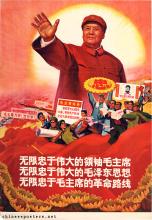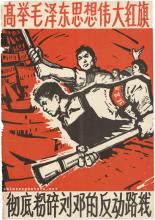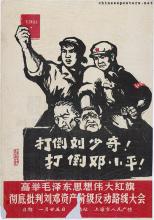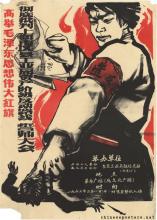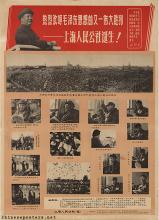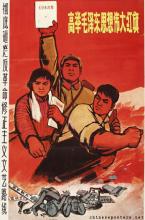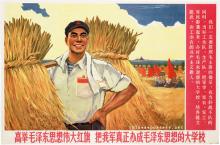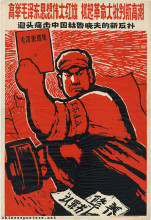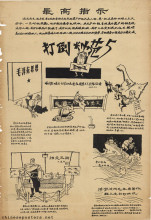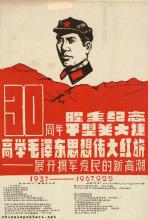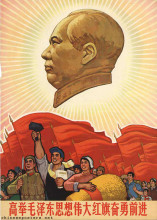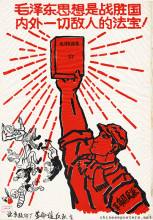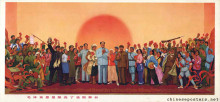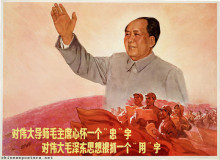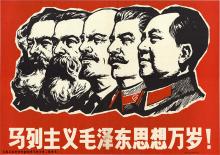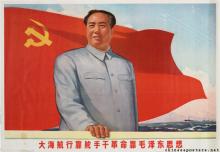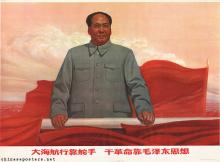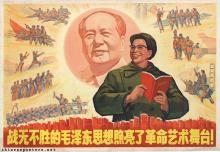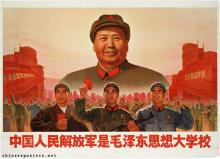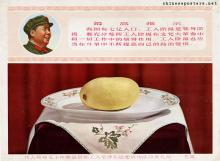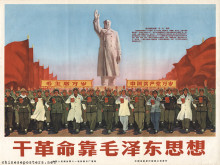Strengthen the study of Marxism-Leninism Mao Zedong Thought, ca. 1951
Mao Zedong Thought (Mao Zedong sixiang, 毛泽东思想), one of the pillars of the ideological complex that supports the People's Republic, is based on the official writings of Mao. The printed versions of the extensive Mao texts, however, have always taken the form of collections of selected writings (xuanji, 选集). This means that many of them have been chosen for political reasons and that their contents may have been altered by editors to make them fit the political circumstances of the moment. As a result, over time Mao Thought has existed in various versions and constellations, depending on the political priorities as they existed at specific moments.
Long live great Marxism-Leninism-Mao Zedong Thought, 1971
Mao was a prolific writer all his life. The use of his writings as a repository of ideological truth evolved after he attained power over the Party in 1935. In the Yan'an period (1937-1947), Mao had the time and the opportunity to study the writings of Marxism-Leninism in translation, to adapt them to the Chinese circumstances and to develop his own brand of sinified Marxism. As a result, the term Maoism started to appear in party publications in 1942. A front-page article in the Jiefang ribao (Liberation Daily, 解放日报) in 1943 by Wang Jiaxing, the Vice-Chairman of the Central Military Commission, was the first locus where Mao Zedong Thought was mentioned.
Chairman Mao's writings are like the sun, 1964
Read Chairman Mao's writings to become a red successor, 1965
Maoism as the new ideology of the CCP was formalized in 1945, when the new party constitution was drafted. The preamble of this document stated that the Party functioned under the great leadership of Mao Zedong Thought. In the 'Report on the Revision of the Party Constitution' delivered by Liu Shaoqi at the time, Mao Thought was presented as 'Chinese Communism', 'Chinese Marxism' and the 'Sinicization of Marxism'. Liu called on all party schools, party propaganda sections, general propaganda training groups and party publications to use Mao's Thoughts as a foundation and teaching material and to disseminate Mao Thought in a huge wave of study. All this clearly was a continuation of the personality cult that had seen its origins in the mid-1940s.
The more we study, the brighter our hearts will become, 1964
With Mao's writings having been elevated to the status of a canon of the new PRC, they had to be made available to the population at large. The decision to edit Mao's considerable body of writings of political theory and military tactics resulted in the publication of the Selected Works in three volumes, covering the history of the Chinese Communist Movement to the end of the war against Japan in 1945. These volumes appeared in the years 1951-1953.
Mao himself actively participated in the editing process of the first edition of his three-volume Selected Works. He was assisted by many others, presumably also by his exegist and chief propagandist Chen Boda. In the process, as the famous Mao-scholar Stuart Schram has concluded, the wording of the texts was altered, passages were deleted or altered, and belated additions were inserted, thus making it extremely difficult to assume that even a single sentence of the printed version was identical to the original without recourse to what Mao had originally written.
Warriors love reading Chairman Mao's books most, 1966
A fourth volume, covering the period 1945-1949, was published in 1960. As the personality cult gathered steam, and political conflicts became more frequent and acute, a clear need was felt for more recent writings of the Chairman. Early in the Cultural Revolution, the Party Central Committee therefore decided to edit further volumes of the Selected Works. Zhou Enlai and Kang Sheng were given the task by Mao in 1969 to start the work needed for the compilation of a Volume V.
Make revolution all one's life, read Chairman Mao's books all one's life, 1964
Mao Zedong Thought is the magic weapon to victoriously combat all enemies at home and abroad!, 1967.
The importance of Mao's Works reached its zenith during the Cultural Revolution, when each household had to have a "Precious Book Table". Here, copies of Mao's works, such as the four volumes of the Selected Works, were stacked. In some cases multiple sets were displayed, as free copies were handed out as rewards for diligent labor and other contributions to the revolutionary cause. The presence of the books did not necessarily mean that they were read. Like the "Little Red Book", they had become sacred, ritual paraphernalia, "the Word made tangible."
Welcoming a son to the woman's family to marry and settle, early 1970s
Despite their attempt at inclusiveness, the Selected Works were not the sole publications written by and dedicated to Mao. Under Lin Biao, who served as Minister of Defense from 1959 until his 'betrayal' of the revolution in 1971, a process of vulgarization of the Mao canon was started. Aside from the "Little Red Book" mentioned above, these vulgarized versions of Mao Thought included the "Three Constantly Read Articles", the Selected Readings from the Works of Mao Zedong (1964), the Selected Military Writings by Mao Zedong (1963, published for use by the People's Liberation Army), and various brochures with brief excerpts. As a result of the rote learning of these simplified versions of Mao's writings, most of the political discourse degenerated into rampantly and excessively used cliches, fixed formulas and empty sloganeering.
Due to the inner-Party struggle between the radicals, led by the Gang of Four, and the moderates under Zhou Enlai over the orientation of the revolution, the editorial work for the Selected Works came to a standstill in the period 1971-1976. After Mao's death in 1976, Hua Guofeng emerged as victorious. In order to present himself as the trueprotector of and heir to Mao's ideological bequest, he took on the responsibility of becoming the editor of the fifth volume, which embraced the years from the founding of the PRC to the end of the Hundred Flowers Movement in 1957. This 500-page volume, which appeared in 1977 and was seen at the time as that year's main literary event, established Hua as the officially legitimated interpreter of Mao's legacy.
Chairman Mao is the great liberator of the world's revolutionary people, 1968
When Deng Xiaoping had ousted Hua from power and had started a process of De-Maofication in the early 1980s, Mao's contributions were reassessed. In the Resolution on Certain Questions in the History of Our Party Since the Founding of the People's Republic of China, adopted by the Sixth Plenum of the 11th Central Committee of the CCP, Mao Thought was no longer seen as the product of one single person, but interpreted as the crystallization of the collective wisdom of all of China's veteran revolutionary leaders.
A shovel and a hammer to make the arduous revolutionary struggle go forward, late 1960s
Use and study Chairman Mao's glorious philosophical thought in a big way, 1971
Gifts that have been sent by Beijing, 1975
Turn philosophy into a sharp weapon in the hands of the masses, 1971
Resolution on CPC History (1949-81) (Beijing: Foreign Languages Press, 1981)
Dennis Bloodworth, The Messiah and the Mandarins - Mao Tsetung and the Ironies of Power (New York: Atheneum, 1982)
Anita Chan, Richard Madsen, Jonathan Unger, Chen Village under Mao and Deng (Expanded and Updated Edition) (Berkeley: University of California Press, 1992)
Guo Jian, Yongyi Song & Yuan Zhou, Historical Dictionary of the Chinese Cultural Revolution (Lanham: The Scarecrow Press, Inc., 2006)
Stefan Landsberger, "The Deification of Mao: Religious Imagery and Practices during the Cultural Revolution and Beyond", in Woei Lien Chong (ed.), China's Great Proletarian Cultural Revolution: Master Narratives and Post-Mao Counternarratives (Asia/Pacific/Perspectives) (Lanham: Rowman & Littlefield Publishers, Inc., 2002), 139-184
Kwok-sing Li (editor) & Mary Lok (translator), A Glossary of Political Terms of the People's Republic of China (Hong Kong: The Chinese University Press, 1995)
Helmut Martin, Cult & Canon - The Origins and Development of State Maoism (Armonk: M.E. Sharpe Inc., 1982)
Mayfair Mei-hui Yang, Gifts, Favors & Banquets - The Art of Social Relationships in China (Ithaca: Cornell University Press, 1994)
The Mao Zedong Reference Archive 
Selected Writings and Speeches of Chairman Mao Tse-tung  [note: 'According to JPRS, these documents are "selected speeches, articles, essays, reports, letters, interviews, declarations, decrees, telegrams, poems, (and) inscriptions of Mao Tse-tung covering a multitude of subjects." In introductory notes, JPRS notes that "All articles signed by Mao Tse-tung, whether individually or jointly with others, are included." Further, "all unsigned articles which have been verified as his work are also available." Finally, JPRS indicates that "all works which have already appeared in the (Foreign Language Press) edition of Selected Works of Mao Tse-tung or Selected Readings of Mao Tse-tung's Works are not included."']
[note: 'According to JPRS, these documents are "selected speeches, articles, essays, reports, letters, interviews, declarations, decrees, telegrams, poems, (and) inscriptions of Mao Tse-tung covering a multitude of subjects." In introductory notes, JPRS notes that "All articles signed by Mao Tse-tung, whether individually or jointly with others, are included." Further, "all unsigned articles which have been verified as his work are also available." Finally, JPRS indicates that "all works which have already appeared in the (Foreign Language Press) edition of Selected Works of Mao Tse-tung or Selected Readings of Mao Tse-tung's Works are not included."']
